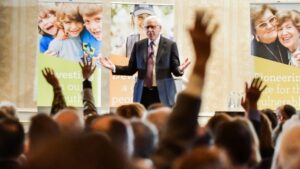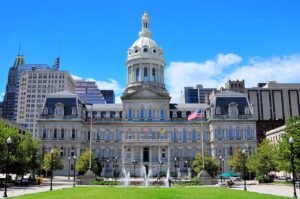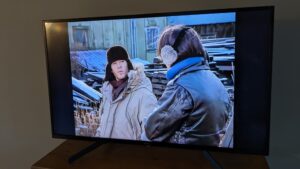Can I get an “Oy vey” out there?
Or at least a “gevalt”?
In a word, yes. But not much beyond a word. Not in Yiddish among my Jews, and not in Italian, Greek, Polish or any of the other foreign languages spoken by first- and second-generation Americans that are now vanishing among their offspring.
We’re the people whose parents or grandparents spoke the language of the old countries and clung to their comforting sounds, and then listened with mixed emotions as their children went strictly with the jargon of the new world.
In vague childhood memories of my great-grandparents, they spoke exclusively in some indecipherable foreign tongues. My grandparents became bilingual. My parents “spoke” South Bronx, which was their “Mother Country,” with a pretty decent command of Yiddish inherited from their folks.
My friends and I are left with “Oy vey,” but not much more than that.
As children in post-war America, my friends and I found such talk — and such foreign language — a distraction, or an embarrassment, since it sounded nothing like our street jargon. We wanted to sound like America.
If the kids were around, Yiddish was my parents’ language of love and hiding. They expressed great affection, or funny insults, or said the things I was not supposed to know.
They lapsed into certain bent speech patterns when reminiscing about departed elders, dredged up from some sweet spot in their memories. It was comforting and comic. They were recalling authentic voices, vanished scenes, chicken fat hanging from extended fingers, the ghosts of lost European shtetls. Each shrug of the shoulder became a poignant image of long ago.
As children in post-war America, my friends and I found such talk — and such foreign language — a distraction, or an embarrassment, since it sounded nothing like our street jargon. We wanted to sound like America.
And what did America sound like? In the post-war baby boom years, it sounded like television, where there hadn’t been an ethnic — or a Jewish ethnic anyway — since Molly Goldberg.
But as we grew older, we recognized that such words and gestures connected us with an authentic past. It’s not just the Jews, it’s every ethnic group with roots sinking deeper into American soil.
Some years back, when I worked on a book called “Journeys to the Heart of Baltimore,” Ted Venetoulis, the former Baltimore County executive, talked of growing up in Southeast Baltimore with Greek immigrant parents who wanted their sons to learn the language of the old country.
But he and his brother “wanted to assimilate very quickly, and if we spoke Greek, we weren’t assimilating, we weren’t American. That’s how kids think. So our parents tried to rein us in. We had a Greek teacher at our home once a week. And we rebelled.”
He shook his head ruefully at memories from decades earlier. “Once,” he said, “it was snowing, it was slippery, and we poured water on the front steps to create ice. To make [their teacher] slip on the steps and never come back. Oh, we were terrible. But we didn’t want to talk Greek. We wanted to be Americans.”
Vince Culotta, part-owner of Sabatino’s Restaurant in Little Italy, talked of his immigrant parents who spoke two different dialects of Italian — and didn’t encourage their children to speak either.
“My father,” Culotta remembered, “wanted me to go into the mainstream of America without even an accent. Your parents didn’t know how to speak English, so you spoke Italian to them. With your friends, you spoke English. But you had a little bit of an accent, and so did they.
“And that could make you feel ostracized. You felt different. And when you’re different, you could be discriminated against. So both my parents, they wanted us to go full run into the mainstream of America. It’s a good country, and they realized it.”
It’s the balancing act that every ethnic group feels. We want to be fully American, but somewhere along the line we also realize the stuff that makes us unique. Maybe it’s religion; maybe it’s just a song. Sometimes it’s the language of old. It slips away with each passing generation, and when we want to bring it back into our lives, we realize we’re a little late in the effort.

A former Baltimore Sun columnist and WJZ-TV commentator, Michael Olesker is the author of six books, most recently “Front Stoops in the Fifties: Baltimore Legends Come of Age” (Johns Hopkins University Press).





